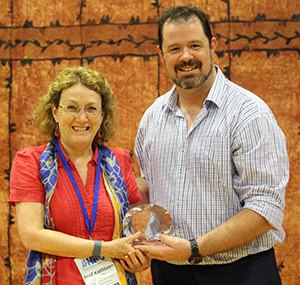
AHURI researcher profile: Kath Hulse
Swinburne University of Technology
10 Jun 2016
Prof Kath Hulse is one of Australia's leading housing researchers, particularly in the area of private rental housing. She won the 2016 Professor Mike Berry Award for Excellence in Housing Research for her paper Renting in a home owning society: Disaster, deviance or diversity?

AHURI Deputy Executive Director,
presents award to Prof Kath Hulse
Growing up in England, as a young adult Kath saw the inequalities apparent in English class-based society and knew that it wasn't fair that people's lives were determined by their background including where they lived. As a consequence she studied Social Policy at the University of Exeter (a mixture of sociology and economics) and postgraduate studies at the University of Birmingham in urban and regional studies, which gave her a great understanding of the spatial dimensions of social issues.
After coming to Australia, and a brief stint in academia, Kath worked in senior roles in government policy design and implementation in the Commonwealth and Western Australia and Victorian State Governments. She became interested in housing whilst working in human services and seeing children at risk of being put into care because their parents were homeless. For Kath it was a mistake that the issue of housing was not seen as part of the problem, or the solution, by government. She also saw it as wrong that housing departments only had a 'one size fits all' approach to providing housing assistance given the diversity of needs.
Returning to study after a career break, Kath completed her PhD in Public Policy in 2001. Since that time Kath has worked on many research projects that have contributed significantly to AHURI's body of work. She is now Professor of Housing Studies at Swinburne University of Technology, and was Director of the Swinburne-Monash AHURI Research Centre from 2004 to 2010.
With her experience in policy design and implementation for government, Kath...brings to her research ... an understanding of how the different academic disciplines that contribute to housing research can inform critical review of policies and contribute to new policy development approaches.
'I think AHURI has an important on-going role to play in housing research and policy development', says Kath. 'However, the independence of AHURI relies on the strong claim that the universities in the network truly are independent. Good research takes time to interrogate the data and reflect on what that data mean. We must be doing research that is in-depth and rigorous, and yet is not so narrow that we miss the emerging issues.'
Kath was a member of the group leading AHURI's first Evidence-based Policy Inquiry. 'The strongest thing about being involved in that Inquiry was the high quality of the people who were invited to sit on the Inquiry panel. Their honest feedback, provided under strict Chatham House rules (i.e. where people could speak freely and openly without being otherwise identified), was hugely beneficial to our research process', says Kath. 'The Inquiry model has also reinforced the role of collaboration between universities, which I think is so important. Although the downside is that Inquiry leaders have to spend a lot more time managing contributions from different institutions.'
Research findings accumulate over time and do help to change how societies see their social issues and the solutions.
With her experience in policy design and implementation for government, Kath sees one of the key skills she brings to her research is an understanding of how the different academic disciplines that contribute to housing research can inform critical review of policies and contribute to new policy development approaches. A lot of her work is in the area of economic sociology and takes an institutional approach to more fully understand Australia's housing markets, including her current research focus onto the role of the private rental sector in Australia.
Effective policy development relies on good research that delivers numbers and modelling, and on qualitative research that investigates how individuals experience social issues.
Kath is realistic about the impact of housing research on policy development. 'Policy is not necessarily rational, and research doesn't provide a quick fix for all social issues. However I do believe that research findings accumulate over time and do help to change how societies see their social issues and the solutions.’ She also strongly advocates for a combination of quantitative and qualitative research methods. Effective policy development relies on good research that delivers numbers and modelling, and on qualitative research that investigates how individuals experience social issues.
